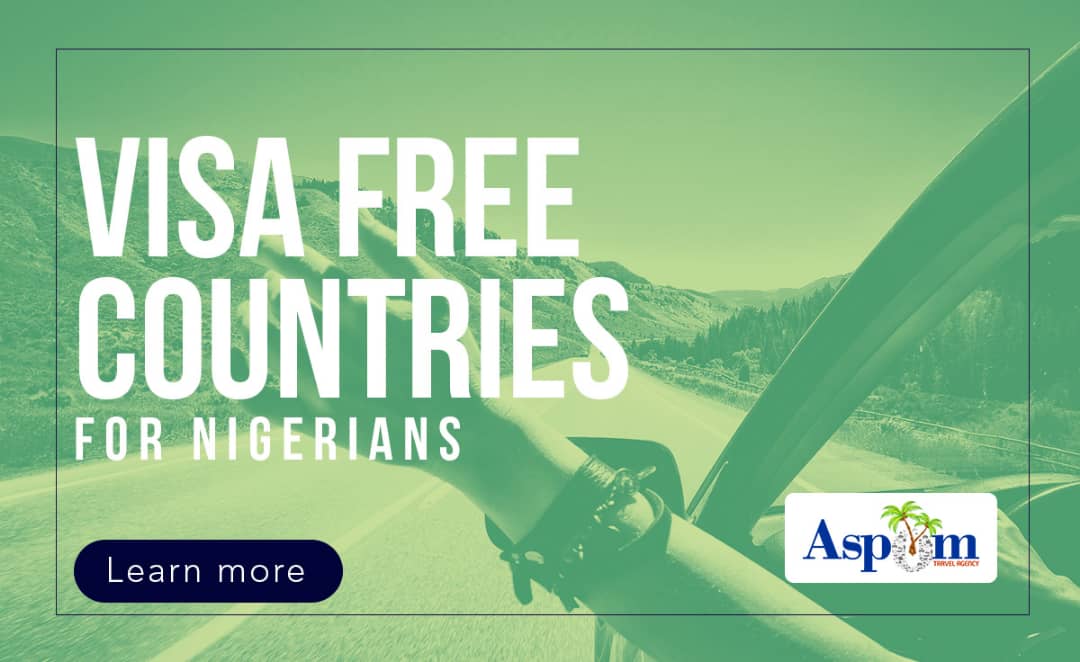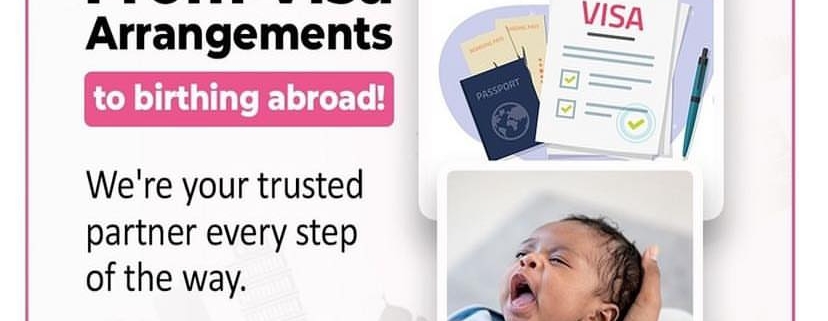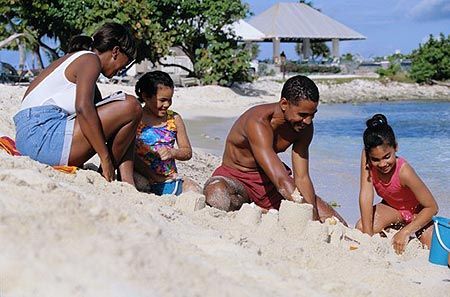 VISA FREE COUNTRIES FOR NIGERIANS
VISA FREE COUNTRIES FOR NIGERIANS
Traveling for Nigerians increasingly requires serious planning. With Nigerian passports ranking 89th in freedom to travel across the world, securing a visa is often difficult and strenuous. Nevertheless, there are visa-free countries accessible to all Nigerian passport holders as well as countries that grant visas on arrival.
Visiting such countries reduces the stress experienced while planning vacations. We decided to compile a list of visa-free countries you can visit with just your Nigerian Passport and still have a good time.
Visa-free countries Nigerian passport holders can visit include the following. Before diving in, its important to note that some of the countries offer visa on arrival to Nigerian passport holders for an affordable fee. Here’s the list:
1. Bangladesh
Asia
Bangladesh is one of the world’s most densely populated countries, with its people crammed into a delta of rivers that empties into the Bay of Bengal. It is the world’s eight most populous country. Dhaka is its capital and largest city, followed by Chittagong, which has the country’s largest port. Due to its mutual Bilateral ties with Nigeria, Bangladesh offers Nigerian Passport holders free 30-day visa upon arrival. However, all visitors have to possess a return ticket and a plausible financial account.
White rice is the staple of Bangladeshi cuisine, along with many vegetables and lentils. Rice preparations also include Bengali biryanis, pulaos, and khichuri. Mustard sauce, ghee, sunflower oil and fruit chutneys are widely used in Bangladeshi cooking. Fish is the main source of protein in Bengali cuisine. Bangladesh might not be a very classy country, but you might want to visit and try out their diverse cuisines.
2. Barbados
Caribbean Region
Barbados, which is the birth country of pop icon, Rihanna, welcomes Nigerians for six months visa-free. This country is in the western area of the North Atlantic and 100 kilometres east of the Windward Islands and the Caribbean Sea. English is the official language here so communication is not a problem. Barbados boasts of 60 amazing beaches and several restaurants with delightful cuisines. If you want to go shopping there, Bridgetown, Barbados’ capital city, has everything from top-notch jewelry shops to small boutiques.
3. Benin Republic
West Africa
Gaining independence from France in 1960, the Republic Of Benin has gone through a lot of metamorphoses down the years. Being a neighboring country to Nigeria, entry by Nigerians is visa-free; as instituted by the Economic Community of West African States. The country is home to the Pendjari National Park, which was nominated as a UNESCO World Heritage site in March 2009. The park is named after the Pendjari River and covers about 2,755 sq km of land. It is home to a number of wildlife, among which are buffaloes, antelopes, West African lions, elephants, and birds among others. You will enjoy quality time at this park if you visit via the hills and cliffs of the Atakora range, which provide a scenic and wonderful backdrop of the park.
4. Burkina Faso
West Africa
With a name translated to mean “The land of honest men”, Burkina Faso is home to a significant amount of gold reserves. Nigerians can visit the country on a visa-free basis and can stay as long as you can provide a return ticket. Probably the thing Burkina Faso is most famous for is its music and drumming culture. If you are interested in learning West African drumming, then this is the country to visit!
As with music, art is also part of the culture of Burkina Faso. The country hosts the International Arts and Crafts Fair in Ouagadougou, better known by its French name as ‘SIAO’; Le Salon International de L’Artisanat de Ouagadougou, which is one of the most important African handicraft fairs in the world.
5. Burundi
East Africa
Burundi offers Nigerians a 30-day visa-free entry duration, as it one of the visa-free countries for Nigerian passport holders. With a population of about 11 million people, Burundians have enjoyed a tradition of expression in the visual arts. Decorated papyrus panels, which feature geometric patterns and often depict themes from Burundian legend, are prized by collectors of ethnic arts, as are Burundian-made swords and drums. Ceramic manufacture, introduced by Italian missionaries in the 1960s, has also been an important form of artistic expression, and Burundian potters have added indigenous elements to this imported medium.
6. Cambodia
Southeast Asia
Cambodia, a country of tourist attractions, offers Nigerians a 30 days visa on arrival in the major airports in Phnom Penh and Siem Reap, as well as at any major border crossing. Cambodia’s beaches are a great place to be, especially for people who crave solitude on the beach. The people in Cambodia are benevolent, assiduous and welcoming.
7. Cameroon
Central Africa
While Cameroon is not the largest country in Africa, in some ways it’s as large as Africa itself. Known as “Africa in miniature” it features French and English speaking portions, Muslim and Christian dominated regions, the tallest mountain in West Africa and terrain that includes rain forest, desert plains, mountains and high plateau. The country, one of the visa-free countries for Nigerian citizens, shares a border with Nigeria, hence being one of the visa-free countries Nigerians can visit. While in Cameroon, you can visit tourist sites like the Limbe Botanic Garden, Benedictine Museum of Mont Febe, National Museum of Yaounde and the Kribi.
8. Cape Verde
West Africa
Cape Verde is a former Portuguese colony. The country offers Nigerians visa-free entry. This island country is located on the West African coast. The official language is Portuguese and the national language is Kriolu. The weather is welcoming due to the surrounding seas. Tourism has been flourishing in Cape Verde, making it a great center of tourist attraction. Cape Verde is said to be a safer destination for solo women travelers. There are loads of fresh fruits for those that enjoy eating fruits. This is a great place for Nigerians to visit without a visa.
9. Chad
Central Africa
Nigerians can visit Chad without worrying about paying for a visa i.e it’s totally free. This is so because its been established that the Country is one of the visa-free countries for Nigerian citizens. Located in the central African region, it’s easily the home and base of a wide variety of wild animals. You can pay a visit to the Zakouma National Park; which includes 44 species of large animals, and many species of birds. If you are one for historical artefacts, it would interest you that the region is full of interesting sandstone formations – graceful fingers of rock and many hundreds of natural arches.
10. Comoros
East Africa
Comoros or The Comoro Islands is situated off the south-east coast of Africa, to the east of Mozambique and north-west of Madagascar. Nigerians acquire a visa on arrival at The Comoro Islands, even though its enlisted as one of the visa-free countries for Nigerians. Comoros offers a lot of get-away ideas with its different and exciting constellation of islands. You can visit the Lac Sale; an amazing lake with a unique 360-degree view of its scenery, while catching a glimpse off the coast beyond Hahaya. You could also watch giant sea turtles laying eggs and dive in the Marine National Park later in the day.
11. The Ivory Coast (Cote d’Ivoire)
West Africa
The Republic of The Ivory Coast grants free visa-free entry to Nigerians. Abidjan is it’s capital city and is quite an attractive city, laced with lagoons and close to the ocean, with many hills and lush tropical flora. You can visit the beautiful Cathedral of Abidjan, perched on a hill overlooking the city; the zoo, although modest but still enjoyable for children; the Parc du Banco, a virgin rainforest; and the large open-air markets in Cocody, Treichville, and other suburbs. A lagoon boat tour offers an impressive view of Abidjan’s skyline. There are many options for trips outside of Abidjan. It is possible to go north to Korhogo or Comoe Game Park on a 3-day weekend, and there are many pleasant day trips.
12. Djibouti
East Africa
Bordered by Eritrea in the north, Ethiopia in the west and south and Somalia in the South-East, Djibouti is a small African country with a population of about 500,000 people. Nigerians can visit Djibouti without having to pay a dime for a visa as it has been enlisted as one of the visa-free countries for Nigerians. The country has some pretty amazing sights. Some include; The Lac Assal (Lake Assal) which doubles as both the second-lowest point on earth and an awesome scenery. You could also go scuba diving across the country’s terrain or paddle for hours in a kayak.
13. Dominica
Caribbean Region
Dominica grants Nigerians a free entry Visa for 21 days. This country is a mountainous Caribbean island with tropical rainforests, waterfalls, lakes, gorges, rivers, and steamy hot springs. The rugged coastline accommodates rustic shoreline villages and rocky black-sand beaches, which tend to be good for snorkelling or diving spots. The currency is East Caribbean Dollar (XCD), while the official language is English. Dominica is a must-see destination for adventurers, lovers, tourists and anyone seeking an epic vacation.
14. Fiji Island
South Pacific Ocean
The Republic of Fiji is situated in the South Pacific Ocean. Made up of 333 islands and about 800000 people, the capital is Suva and English is one of the official languages. This Oceania country is said to have one of the most developed economies in the Pacific. As a Nigerian Passport holder, you can stay in the country for 4 months without a visa, but you may need a visitor’s permit for the period of your stay. This permit can be renewed after the visa-free period. In Fiji, you can explore the incredible beaches, diverse marine life and some of the most appealing tropical scenery.
15. The Gambia
West Africa
The Gambia holds the title of the smallest country in Africa, occupying the length of the Gambia River valley and its surrounding hills. Nationals of Nigeria may enter The Gambia visa-free for up to 90 days. There are different tourist ideas in the country; You could visit the Kachikally Crocodile pool or the beautiful Sanyang Beach. Road trips to different parts of the country are usually very exciting. The country also has a very wide variety of wildlife. It’s no surprise that the Country is one of the visa-free countries for Nigerians.
16. Ghana
West Africa
A country of friendly and welcoming people, Ghana is increasingly becoming a favorite tourist destination. As part of ECOWAS benefits, Nigerians can enter the country visa-free or sometimes may be given a visa on arrival. The country is famous for its various slave trade historic artifacts such as forts built by the British, Dutch, Danish, Germans, Portuguese, and the Swedish dotted along the coast. You can also hang out on the beautiful beaches such as Kokrobite and Winneba; visit the two renowned national parks inland, or check out the remote history of the Ashanti, including the Manhiya Palace, the Asantehene’s Palace and Okomfo Anokye Sword.
17. Guinea
West Africa
A warm, remarkably small country roughly the size of the United Kingdom, Guinea, one of the visa-free countries for Nigerians offers visa-free entry. While they have tremendous natural resources available to them (which includes around one-half of the world’s reserves of bauxite, and many major golds, jewel, and metal industries), they rate very poorly in the UN’s quality of life index. One of Guinea’s strong points is it’s National Museum which highlights the distinct ethnic tribes in Guinea along with various traditional instruments.
18. Guinea-Bissau
West Africa
A country bordered by Guinea to the south and east, and Senegal to the north, Guinea-Bissau offers a 90-day visa to Nigerians on arrival. The country has a couple of forests and a natural park where you can see chimpanzees if you’re lucky.
19. Haiti
Caribbean
Haiti is a Caribbean country that occupies the western third of the Caribbean Island of Hispaniola. Nigerians receive a 90-day free visa on arrival. Due to its mountainous terrain, Haiti is a heaven for hikers and explorers. You could pay a visit to the Labadee Resort managed by the Royal Caribbean International. Attractions in Haiti include numerous beaches, water sports, a waterpark and traditional Haitian dance performances.
20. Iran
Middle East
Known as Persia until 1935 in the western world, whereas the indigenous name has been Iran forever. Iran became an Islamic republic in 1979 after the ruling Shah was forced into exile. Iran provides visas to Nigerians on arrival.With, of course, a heavy price, you can take a tour to the Ancient cities, Armenian churches, Museum; which houses an impressive collection worth over $2.5 billion dollars, the Palaces or tombs of Famous people like Cyprus the Great, Imam and Reza, Mordechai and Esther, etc. Surprisngly, Iran is one of the visa-free countries for Nigerian passport holders.
21. Kenya
East Africa
Nigerians have access to 90 days free visa entry into Kenya, a country of incredible wildlife. You can travel to Kenya for a fun ride through the wild safari and engage in fun activities such as snorkelling and sunset watching. You can also try the amazing local cuisine. Kenya is known as one of Africa’s most impressive locations for a vacation. Iconic landmarks such as Mount Kenya stand above the savannah flatlands and tropical woodlands while its waterfalls are nestled within the foothills. Refreshing breezes drift across the Indian Ocean to rejuvenate your soul in the country’s many coastal towns and islands. From her highest peaks to her deepest ocean depths, Kenya offers you an African dream trip of a lifetime!
22. Liberia
West Africa
A country with strong historical ties to the United States, Liberia offers visa-free access to Nigerians due to being part of the ECOWAS. The country easily boasts of numerous beaches in and around the capital city of Monrovia. For an interesting day trip, Robertsport offers a glimpse of Liberia’s cultural history as well as clean, beautiful beaches. A group of South Africans has set up a tent camp for those wishing to spend the night on the beach and the UN also offers accommodations on a first-come basis.
23. Madagascar
East Africa
Nigerians receive Visa on arrival in Madagascar, due to its status as one of the visa-free countries for Nigerians for 90 days. Madagascar is known to be the world’s 4th largest island and is notably regarded as the world’s 8th continent, owing to its unique ecology that has allowed a distinct and endemic island to evolve. After separating from India over 88 million years ago, Madagascar is now a part of the African continent and is situated off the South East coast of Mozambique. Different species of palm trees surround the waters. Several traditional wood carved canoes can be seen either between the shade trees or on the crystal waters. The Indian Ocean provides the impeccable accompaniment for swimming, snorkeling, and some smooth surfing.
24. Maldives
South Asia
Consisting of over a thousand coral islands, excluding tourist resort islands, The Maldives lies in the Indian Ocean. As one of the enlisted visa-free countries, Maldives, offers a 30-day visa to Nigerians on arrival. With most of its islands used predominantly for tourism and agriculture, the country has a rich and fresh bouquet of tourist attractions. Whether you want to dive and surf in its waters or you’re planning the perfect honeymoon, The Maldives gives you so much more.
25. Mali
Sahel
This country is visa-free to Nigerians. A country landlocked in the Sahel, Mali holds a lot of history of a past full of struggle. However, it has some incredible sights, including four UNESCO World-Heritage sites, and the historic city of Timbuktu.
26. Mauritania
West Africa
Mauritania offers Nigerians Visa on arrival as. The country is situated between Morocco, Mali, Algeria, Senegal, and the sweep of the Atlantic Ocean. This is a country brimming with history. In Chinguetti, one of the incredible cities of this country, one can pay a guide or any local that knows the desert and traverse the desert on a camel for as long as your “Ouguiyas” (Mauritanian currency) will allow. The tea doesn’t end, and the dunes don’t end.
After your Camel trek, you may choose to explore Chinguetti, which boasts of an impressive “Old City”; a crumbling, sandstone village, with numerous antiquated mosques, and a few libraries. With a country mainly covered by desert, Mauritanians live a simpler form of life; they are a kind and welcoming people, willing to share their stories with you, and hear some of your own. With an adequate command of French (or the more widely spoken Hassini), you can experience the real pleasure of the country, which, like in most of West Africa, is the people.
27. Mauritius
East Africa
Mauritius offers Nigerians a visa-free entry for 90 days. This country is an island nation located along the coast of the Indian Ocean, about 2,000 kilometers off the southeast coast of Africa. Mauritius is an English/French-speaking country with a tropical climate, making it a nice and warm place to be. It also has clear, warm sea waters and beaches which make it impeccable for fun activities like snorkeling and scuba diving. With long stretching beaches, verdant forestry, and imposing volcanic peaks, Mauritius is a gorgeous spot for romantic getaways
28. Micronesia
Oceania
A country located in the northwestern region of Oceania, Micronesia offers a 30-day visa to Nigerians on arrival.
29. Mozambique
Southern Africa
From the 2,436 m Monte Binga peak to the stunning beaches along the coast, Mozambique is a country of contrasts. This beautiful country allows a 30day visa for visiting Nigerians given on arrival. Located on the eastern coastline of the Indian Ocean, Mozambique is home to a fantastic draw of scuba divers, fishermen, sailors and beach lovers. The sights in Mozambique range from historical attractions to natural wonders that will take your breath away. The beautiful clear blue ocean is the perfect setting for a range of water sports or just a quiet getaway with a lover.
30. Nauru
Oceania
Also known as the world’s smallest republic, Nauru offers visa on arrival to Nigerian passport holders, as one of the visa-free countries for Nigerians. Taking a trip there affords you the opportunity to visit sites like Japanese sponsored Anibare Harbour and explore world war relics in Yemen.
31. Niger Republic
West Africa
This West African country shares a border with Nigeria. Due to being part of the ECOWAS body, Nigerians can travel to this country visa-free.
32. Palau
Oceania
A beautiful nation famous for its jellyfish lakes, Palau grants Nigerians a 30-day visa on arrival. Important places to visit in Palau include the Palau International Coral Reef Center, Nikko Bay, Icebox Park and The Etpison Museum. Palau is most famous for scuba diving, with amazing dive sites like The Blue Corner, German Channel, Ulong Channel and Blue Holes.
33. Samoa
Oceania
This Island nation in the south pacific grants Nigerians a 60-day visa on arrival. Located between Hawaii and New Zealand, Samoa is home to an abundant amount of waterfalls, blowholes, exciting caves, beaches, museums and much more. Samoa is a popular place to get married and spend your honeymoon. Several hotels and resorts offer special packages on their websites with adequate arrangements.
34. Senegal
West Africa
With the Atlantic ocean to the west of this West African country, Senegal is home to teaming population of African wildlife. The country is visa-free for all Nigerians due to its membership in the ECOWAS body. You could take a trip to Senegal and pay a visit to the reserve filled with different wild animals such as giraffes, rhinos, elands, antelopes, and different bird species.
35. Seychelles
East Africa
Situated off the coast of East Africa in the Indian Ocean, Seychelles one of the visa-free countries for Nigerians is bordered by other islands like Zanzibar, Madagascar and Mauritius. Seychelles was mainly unoccupied until the late 18th century when French traders and sailors reached its shores. Today, Seychelles boasts of a diverse blend of cultures—French, British, African, Indian, Chinese and Arab—as well as incredible cuisines and some of the best beaches in the world. It offers a visitor’s permit for a month to Nigerians. English and French are spoken in Seychelles. Each of the 115 islands of Seychelles has its own flair and a mystical enticement.
36. Sierra Leone
West Africa
Located on the West Coast of Africa, Sierra Leone is one of the visa-free countries for Nigerians as part of ECOWAS regulations.Interesting places to visit include the beaches in the Freetown peninsula and Banana Island; which offers unsurpassed natural beauty, history, water activities among other attractions.
37. Somalia
East Africa
This country grants visa upon arrival to Nigerian passport holders. Due to its fantastic scenery and extreme weather, Somalia is teeming with wildlife. Animals ranging from meerkats to lions inhabit much of Somalia. Many parks have taken animals out of Mogadishu to safety in zoos such as Lag-Badana Park in the outskirts of Mogadishu. You could also visit the Somali beach in Mogadishu.
38. Sri Lanka
South Asia
Nigerians traveling to Sri Lanka will require the “Electronic Travel Authorization” that will allow their 30 days stay. Sri Lanka is a country that boasts of golden beaches, rising waves, misty mountains, mighty elephants, stealthy leopards, giant whales, a majestic past, lovely tea and warm smiles. With several sites and scenes situated on this small island, Sri Lanka is a perfect travel destination. This country provides an array of holiday experiences, which range from sun-tanned beach holidays to an abundant opportunity for wildlife watching, amazing adventure sports and a pilgrimage to some of the oldest cities in the world. The smiles and hospitality of Sri Lanka make the country world-famous. With so many cultures and cuisines in Sri Lanka, this country is an ideal place for vacation without a visa.
39. Tanzania
East Africa
Tanzania, one of the visa-free countries for Nigerian passport holders, provide visas at the entry point, upon arrival. Tanzania, asides having three of Africa’s Seven Natural Wonders, is also blessed with the highest mountain in Africa, and the largest and deepest lakes in Africa. Tanzania is a must-visit for those looking for a country to travel to for vacation without a visa. In Tanzania, there is so much to see and do, such as exploring wildlife, culture (especially of the Maasai people), the Mount Kilimanjaro, and the great Zanzibar. Zanzibar is an archipelago of historic Indian Ocean islands. It boasts of intriguing and idyllic beach experiences. Zanzibar has an extensive range of accommodation options and a lot to see, do and discover. It is the perfect place to relax after an exciting safari or climbing Kilimanjaro. It is known to be a superb nirvana for honeymooners or an excellent romantic holiday getaway.
40. Timor Leste
Southeast Asia
Commonly known as East Timor, the country lies northwest of Australia in the Lesser Sunda Islands. Timor Leste grants a 30-day visa to Nigerians on arrival. A fairly small country, Timor is a favorite zone for scuba diving and sea exploration.
41. Togo
West Africa
Being a West African State, Nigerians do not require a visa to enter the country. Argued to be one of the nicest places in West Africa, Togo is filled with white sandy beaches, friendly people, and hills and mountains waiting to be explored.
42. Tuvalu
Oceania
Consisting of a group of low-lying islands along the South Pacific, Tuvalu is the fourth smallest country in the world. The country offers Nigerians a 30-day visa on arrival. What this island nation doesn’t have in a city-like destination or architectural heritage, it makes up for in Traditional local culture. Whether you want to be awed by the warmness of the natives, or you want to spend time in the palm trees on the beaches with your loved one, gazing into the sunset, Tuvalu will blow your mind.
43. Uganda
East Africa
This African country offers Nigerians visa on arrival. Famously known as the Pearl of Africa, the country is home to different kinds of African fauna. If you’re looking for an adventure while in Uganda, you can go on gorilla tracking or go on an excursion to the Queen Elizabeth National Park.
44. Vanuatu
Oceania
This country is one of the visa-free countries for Nigerian passport holders and consists of 83 islands in the Southwest Pacific and offers a visa to Nigerians on arrival. The country has a couple of well-known attractions such as the Yasur Volcano on Tanna and the Coolidge dive in santo.










